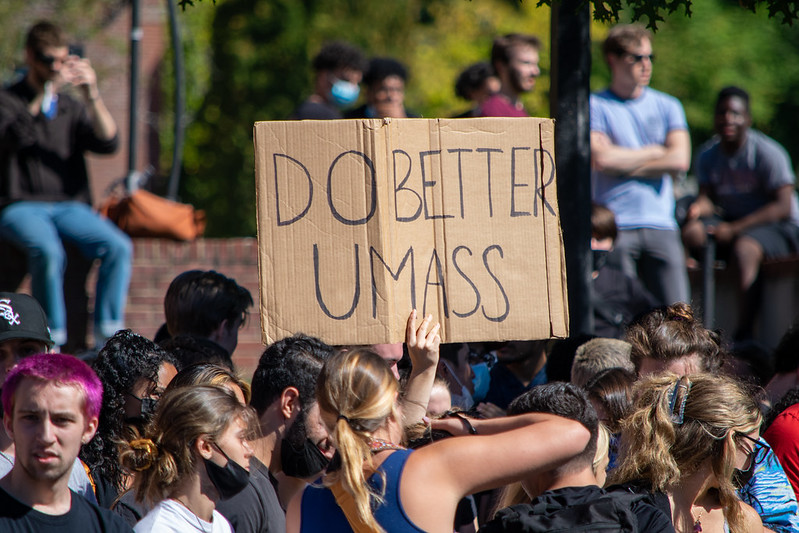Nearly 10 student protests occurred at the University of Massachusetts during the first two months of the fall 2021 semester. Students gathered on campus against cases of sexual assault, racial injustice and animal abuse with varying turnout and success rates, and many continue to push for a more forceful response from the University.
UMass is home to a rich, decades-long reputation of effective student activism, a history that should provide a source of hope for students protesting this year.
Student protests fueled early opposition to the Vietnam War throughout the 1960s. UMass’ 1970 commencement ceremony was an opportunity for public demonstrations against the war.
A local newspaper wrote, “The roll of the funeral drum set the beat for 2600 young men and women marching ‘in fear, in despair and in frustration.’ Red fists of protest, white symbols of peace, and blue doves were stenciled on black academic gowns, and nearly every other senior wore an armband representing a plea for peace.”
The same year, several parents bought a full-page advertisement in the Massachusetts Daily Collegian urging students to support the withdrawal of military forces in Cambodia and Laos.
“Convincing your parents may be a real challenge, but it may be one of the most important things you’ve ever done,” it reads.
Anti-war protests at UMass contributed to a larger movement. Considering their impact without such context is incomplete. The same is true of recent allegations of sexual assault at UMass. Students across the country are engaged in similar protests against fraternities, and their concurrent action is what garners national attention.
In 1978, the Daily Collegian reconsidered a decision to block the implementation of four ad-free pages for “women’s news” each week after protesters occupied the paper’s office for 11 days.
“The group of protesters voted to remain in the office until their demands were met. They also said they would try to keep people from picking up the Collegian today and also organize a boycott of the Collegian,” reads Collegian coverage from April 13, 1978.
“The Collegian claims to print what is most newsworthy, yet it daily takes up more space with comics, crossword puzzles, horoscopes and T.V. listings than we are asking for women’s news. That makes a clear statement of Collegian priorities and lack of respect for women’s lives,” Collegian Women’s Editor Julie Melrose said.
Around 50 protesters agreed to vacate the Collegian’s office with the formation of a committee to investigate the issue that summer. The occupation attracted the attention and support of radical feminists Robin Morgan and Andrea Dworkin and hundreds of UMass students, but it did not go without criticism. A letter to the editor following the occupation accused the women of protesting solely for personal gain.
“Don’t delude yourself into thinking you are doing it for others, unless it has never crossed your mind what you can get out of it,” wrote Darlene D’Amour.
The women’s news advocates did not immediately achieve their goal at the Collegian, but their protests launched an unavoidable, campus-wide discussion about gender discrimination in news coverage. Setbacks and opposition are not unique to this protest or any other. They show what can be overcome and offer lessons to those continuing the movement.
14 years ago, the Student Government Association and Graduate Student Senate encouraged students to go on strike from their classes in an effort to rollback student fees, increase diversity funding and gain control over student spaces in the Campus Center.
More than 1,000 students skipped class, some opting instead to attend teach-ins and a march from the Student Union to the Whitmore Administration Building.
“‘I want to know that there has been change. I don’t want all the work that I’ve done and all the work others in student government has been in vain,’” SGA Vice President Ruth Thompson said about the strike.
Students were frustrated with the University’s lackluster response to a range of issues, not unlike this semester. The 2007 strike brought attention to negotiations between the SGA and the administration and made students aware of policy issues.
Creating change has never been a linear process. Past strikes and protests at UMass did not perfect campus culture and policies, far from it, but they offer a source of inspiration for the present. Students today can continue the University’s legacy of activism by engaging in peaceful protests, staying up to date on campus issues and writing letters to the editor at the Daily Collegian. One day, a future columnist may cite your voice as an effective agent of progress at UMass.
Catherine Hurley can be reached at [email protected] and followed on Twitter @cath_hurley.




















